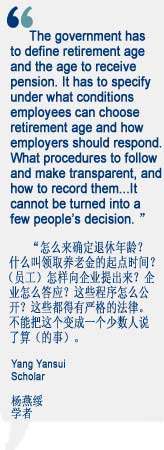中国人是否应该晚退休?
Transcript -- 文字实录
1978年国务院规定中国男职工法定退休年龄为60岁,女职工为50岁,女干部为55岁。6月5日,人力资源和社会保障部提出未来会逐步将退休年龄推迟5年。这个消息引起了广泛的讨论。 事实上,这并不是人社部第一次提出这个方案。但是延迟中国人的退休年龄究竟好不好呢?政府推动这个方案有什么更深层的社会原因呢?现行的养老保险制度又存在着哪些问题?在讨论这些问题之前, 让我们先听听大家是怎么说的。
In 1978, the State Council regulated that Chinese male employees should retire at the age of 60, female employees at 50 and female officials at 55. On June 5, the Ministry of Human Resources and Social Security said it is going to gradually push back the retirement age by 5 years. The announcement drew wide discussion. In fact, this wasn't the first time the ministry proposed the move. But is it a good idea for Chinese workers to retire at a later age? In what social context is the government's push rooted? And what are some of the more fundamental problems existing in China's current pension system? Before we get into these questions, let's hear what people have to say first.
记者:请问您几岁时退休的?
Reporter: At what age did you retire?
受访者:五十二岁。
Respondent: Fifty-two.
受访者:我是五十五岁。
Respondent: I was 55 years old.
受访者:我现在算是内退了。内部退养就是还没有到法定的退休年龄,但是又有单位或者个人的各种(原因),你没法继续在工作岗位了。
Respondent: I retired early. That means I didn't reach the official retirement age but was no longer able to work for personal reasons.
记者:您理想的退休年龄是几岁?
Reporter: What is your ideal age for retirement?
受访者:应该是六十多岁。
Respondent: Sixty-something.
受访者:六十吧。
Respondent: Sixty.
受访者:五十多就行。
Respondent: Fifty-something would be good.
受访者:想越早越好,但是觉得目前五十五岁还是可以接受的。
Respondent: The earlier the better. But I think the age of 55 that's currently required is acceptable.
受访者:六十到六十五吧。
Respondent: Sixty to 65.
记者:如果将现在的法定退休年龄推迟五年,您认为对社会会有什么影响?
Reporter:If we delay the retirement age by five years, what impact do you think it will have on society?
受访者:我认为各有利弊。有利的一面就是一些工程技术人员、有特长的中老年人会为社会发挥余热, 做出一定的贡献,弊的方面就是影响年轻人的就业。
Respondent: I think there are pros and cons. The positive side is that middle-aged and elderly professionals can continue to make contributions to society. The negative side is that young people may have difficulty finding jobs.
受访者:我认为这个可以。现在很多人六十岁(的人)都身强力壮的。
Respondent: I think that would be good. Many 60-year-olds are still physically strong.
受访者:如果说(像)公务员那种在位比较舒适一点,比较有权势一点的,我想是越晚退越好。
Respondent: For people like civil servants, who have comfortable jobs or are in power, it is the later the better.
受访者:进入老龄社会,老年人越来越多。如果再延长五年的话,得到的机会平台会越来越少的。
Respondent: In an aging society, the number of elderly people is growing. If we push back retirement by another five years, young people will have fewer and fewer opportunities.
受访者:关于医疗这一块,还有孩子的教育这一块有一些更好的保障。我觉得五十五岁再推迟五年,应该还是有一定精力可以再工作的。但是如果社会保障这块做得不是特别好,那么到时候,五十五岁推迟五年,可能这期间会比较累。就看这个社会怎么做到(使)我们压力减小。
Respondent: If our healthcare and children's education can be better guaranteed, I think I will still be able to work for five more years. But if the social security is inadequate, I will find it quite hard to work another five years. It depends on how the society can reduce the pressure that's on us.
养老保险制度的基本概念是公民通过缴纳养老金税来赡养当前的退休老人。在这个人退休后,他(她)又由年轻一代的纳税人来赡养。根据中国2010年通过的《社会保险法》,中国基本的养老保险制度将人群分为四类:城镇职工,公务员和事业单位职工,农村居民,以及城镇居民。城镇居民又包括个体、非全日制从业人员、无就业人员。
The basic idea for a pension system is citizens pay social security taxes to fund current pensioners. When a person retires, he or she will be funded by the younger generation of tax payers. According to China's 2010 Social Security Law, China's basic pension system divides people into four categories: urban employees, State employees, rural residents, and urban residents, which includes self-employed, part-time employed and unemployed residents.
中国基本养老保险制度由社会统筹和个人帐户组成。每个月,城镇职工缴付个人工资的8%的社会保险税到个人帐户里。用人单位缴付员工工资的20%到社会统筹帐户里由各当地政府管理。事实上,所有的个人帐户都是虚拟的,因为职工直到退休后才可以领到养老金,同时还需要缴费15年以上。
China's basic pension system consists of social pooling and each citizen's individual account. Each month, urban employees pay 8 percent of their wages as social security taxes to their individual accounts. Employers pay an amount equal to 20 percent of each employee's wages to the social pool, which is managed by local governments. Individual accounts are in fact, virtual, because employees will not be able to cash out their pension until they retire, and have contributed to their individual accounts for at least 15 years.
一个职工的养老金来自两方面:一是社会统筹拨给他(她)的钱,二是个人帐户里的钱。但是,国家公务员和事业单位职工不需要每月从工资中缴纳社会保险税,国家财政为他们缴付,他们退休后也直接从国家领取退休金。农村和城镇居民参加基本养老保险,也需要缴纳15年以上的社会保险税到自己的个人账户中。他们的养老金将来自于个人帐户里的钱和国家补贴的基础养老金。除了强制性的基本养老保险制度,中国还有企业年金和商业养老保险,个人和单位可以自行选择。
Their pension will come from two sources: first, the money allotted to them from the big, social pool. and, second, the money from their individual accounts. State employees, however, do not pay monthly social security taxes from their work wages by themselves. The State revenue pays for them. They receive pension directly from the State after they retire. Rural residents and urban residents can participate in the basic pension system by contributing social security taxes to their individual accounts for at least 15 years .Their pension will come from their individual accounts as well as a base pension provided by the State. In addition to the basic pension system, which is compulsory, there are also enterprise annuity and commercial pension insurance. They are optional for companies and individuals to choose.
根据2011年由中国社会科学院出版的《中国养老金发展报告》,在欧洲,几乎所有发达国家的职工均在61岁或以上退休。在英国、德国、西班牙和瑞典,职工在65岁退休,在冰岛和挪威,67岁退休。通常发达国家的居民缴费至个人帐户约41年,相比之下,中国只要求15年。
According to the 2011 China Pension Report published by the Chinese Academy of Social Sciences, in almost all developed countries in Europe, employees retire at the age of 61 or above. In the United Kingdom, Germany, Spain and Sweden, employees retire at 65, and in Iceland and Norway 67. Normally, residents of developed countries contribute to their individual pension accounts for 41 years, whereas China requires only 15 years.
那么对于退休年龄的讨论与中国的养老保险制度有关吗?我们在演播室电话采访了郑秉文,他是《2011中国养老金发展报告》的主编。
Does the discussion over retirement age have anything to do with the structure of China's pension system? We called Zheng Bingwen from our studio. He is the lead author of the 2011 China Pension Report.
冯欣:郑教授,我在网上看到现在大部分网友似乎都反对政府延迟退休年龄,而大部分专家似乎都支持这种做法,对于这种分歧,您的观点是什么?
Feng Xin: Professor Zheng, I found online that most netizens seem to object to the idea of delaying retirement, whereas most experts seem to support the idea. What do you think of that disagreement?
郑秉文:我觉得这种分歧是自然的。在国外,提高退休年龄也不是一帆风顺的。我们可以从提高退休年龄产生的分歧看出一个规律,这个规律是什么呢?一个国家,如果它的退休制度、社会保障制度是碎片化的,那么它提高退休年龄遇到的阻力就特别大。如果它不是一个碎片化的制度,那它就很容易提高退休年龄。
Zheng Bingwen: I think it's natural. It's not easy to change the retirement age in other countries either. We can find a pattern in the disagreement on raising the retirement age. What's the pattern? If a country's retirement system and social welfare are fragmented, trying to raise the retirement age becomes a much more difficult process. If its systems are not fragmented, it's easy to do.
冯欣:什么叫做“碎片化”的制度?
Feng Xin: What do you mean by "fragmented systems"?
郑秉文:你比如说西欧一些国家,他们的碎片化程度非常高。一个群体一个制度,有的国家是四个制度,五个制度,每个制度下面还有小的制度,形成碎片化,法国是最典型的。你比如说美国,还有北欧,战后他们提高退休年龄就比较顺畅,尤其美国,因为它们是一个制度。不同群体都是在一个制度里,所以不同群体感到它是公平的,没有攀比的现象。但是在是实行碎片化制度的国家就不是这样了。在法国,那么多的碎片化制度。你要是提高某一个群体的退休年龄,它会攀比另一个群体的,每一个群体都感到自己划不来。那么在中国,遇到提高退休年龄这么大的反对声音,而且这么多年来是一次比一次激烈,一次比一次讨论的范围更大,我个人觉得跟我们退休制度双轨制、多轨制、碎片化是有很大关系的。我觉得从这个角度上来看,从社会公正角度来看,反对的声音,尤其是理性的一面,说明我们这个制度不公。制度碎片化的现象存在着,它严重地制约了我们进一步对社保制度进行改革的可能性。
Zheng Bingwen: For example, many Western European countries have highly fragmented systems. One social group has one system. Some countries have four or five systems. Under each system, there are sub-levels. They are very fragmented. France is a typical example. However, the United States and Northern Europe easily raised their retirement ages after the war, especially the United States. Different groups live within the same system, and therefore they feel equal. There is no comparison. However, countries with fragmented systems are different. In France, there are so many fragmented policies. If you want to raise the retirement age of one group, people will compare it to that of another group. Every group feels that it loses in certain ways. In China, we encounter a lot of opposing voices on rising retirement age. The voices have been getting more and more intense. The discussion has become wider and wider. I personally think it's largely related to our double- or multi-track systems as well as fragmented policies. Therefore, I think from a social-fairness point of view, the opposing voices, especially the rational ones, indicate the inequality in our system. The fragmented policies seriously hinder the possibility to further reform our pension system.
冯欣:好的,非常感谢您。
Feng Xin: Thank you very much.
除了社会公平以外,还有更多的问题需要我们考虑,我们采访了研究中国社保的专家杨燕绥。
Apart from social fairness, there are more issues to be considered. We talked to Yang Yansui, a leading expert in China's pension system.
冯欣:杨教授,现在大家对“是否延迟退休年龄” 这个问题讨论比较热烈, 您觉得主要争议在哪呢?
Feng Xin: Professor Yang, there's wide discussion on whether we should push back the retirement age. What do you think to be the major controversies?
杨燕绥:关于退休年龄,它是由一个国家劳动人口和老年人口的赡养比来决定的, 所以当五个劳动人口养一个老人——我们假设这五个劳动人口都能就业,他们都有纳税能力,每挣100块钱,10块钱去交养老金税了,五个人去养一个老人,老人得到了50块钱,你看这几个指标是不是大家还相对能接受?但是如果四个养一个是不是就不可以接受了?
Yang Yansui: Retirement age is determined by the dependency ratio between the number of elderly people and the workforce. Let's say five workers support one old person. We assume they are all employed and able to pay taxes. For every 100 yuan each worker makes,10 yuan is taken out as pension tax. Five workers contribute 50 yuan to one elderly person. People can normally afford that tax. But what if four workers now have to support one elderly person?
冯欣:负担就更重了。
Feng Xin: The burden gets heavier.
杨燕绥:如果四个养一个,那我们对年轻人征多少养老金税?征15%吗?那么他的可支配收入剩85(元)了。这时候他又要养孩子,还要买房子,他们甚至还要继续教育,自学等等,实际上这时候年轻一代接受不了了。那我们降低养老金呢?再降低剩40(元)了,老年人还能吃饱饭吗?也不能接受了。
If four support one, how much do we have to tax young people? Let's say 15%. Then each worker's dispensable income is 85 yuan. If the worker has to raise a child, buy a house, or even pursue further education, he or she would not be able to afford the tax. What if we decrease the pension? Let's make it 40 yuan. Can the elderly person still be fed? No.
冯欣:这里我插一段问一下,您刚才说到五个养一个的时候,这个国家也许能够对付过去,四个养一个的时候也许就对付不过去了。我们现在的情况是什么样子的?
Feng Xin: Sorry to interrupt,you just mentioned that when five support one, the country might be able to cope with it. But when it comes to four to one, it might just not be able to. What's our situation now?
杨燕绥:边际,边际赡养率,那就是不可能低于它了。中国的情况是这样的,2010年中国还是九个养一个。到2020年的时候,咱们就是五个养一个。
Yang Yansui: It's called "marginal aged-dependency ratio", meaning we can't go lower. In 2010, nine workers supported one elderly person in China. But by 2020,five have to support one.
冯欣:这么快?
Feng Xin: That fast?
杨燕绥:因为你知道,我们过去30年计划生育少生将近5亿人口,但是老年人长寿了,所以中国在未来10年这个爆发了。但是我要强调的(是),刚才说的是统计口径。统计口径就是15岁到64岁,这个期间我们都认为他充分工作了,而且他收入可以缴纳所得税、社保税,但是是这样吗?你想,15岁到64岁的人都是在充分就业吗?他们都收入很好吗?
Yang Yansui: Yes. You know, because of the family planning policy over the past 30 years, we had nearly 500 million fewer people, but people live longer than before. The problem will break out in the next decade. But I want to emphasize that I was talking about statistics. We assumed people between 15 and 64 are all employed and able to pay income tax and social security taxes. But is that really the case? Can everyone from 15 to 64 be fully employed? Do they all have good income?
冯欣:15岁很多人还在上学。
Feng Xin: Many 15-year-olds are still in school.
杨燕绥:你说对了。所以我们现在正在研究一个问题叫“实际赡养比”。这个实际赡养比真的很严重,当然我们现在还没有最准确的东西,不好公布,但是大家可以想像,绝对不是九个养一个。在有的地方已经是三个劳动人口去养一个老人,老龄化严重的地方三个甚至两个。2020年统计口径上五个养一个。如果中国不能实现充分就业的问题,如果我们不能使低收入的人提高收入,他们不仅养自己也能养老人的问题,如果我们不纠正往后推延退休年龄的问题,到2020年实现全面小康社会的时候,实际上我们是一个老年赡养比非常严重的(国家),它会带来一系列的社会问题,直接威胁我们2020年实现全面小康社会的目标。
Yang Yansui: You are right. So, we are now studying what's called the "actual dependency ratio". The problem is really serious. Although we can't release our findings yet, we can assume it's definitely not nine to one. In some places, it's already three to one, or even two to one. Statistically, it will be five to one in 2020. If China doesn't take itself to full employment, increase low-income people's earnings so that they can not only feed themselves but also elderly people, or push pack the retirement age. By 2020, we will become a seriously aged country. It will lead to a series of social problems and directly threaten our goal of having a prosperous society in 2020.
冯欣:表面上,大家是在讨论我们是否应该延迟退休年龄,但是这个争议本身的产生是由什么原因导致的呢?换句话说,这个争议折射出什么更深层的问题呢?
Feng Xin: On the surface, people are discussing whether we should delay our retirement age, but what has caused this controversy? In other words, what deeper problems does the controversy imply?
杨燕绥:我也看了看网上大家的说法,我觉得主要还是两个问题。第一个问题,大家说,推迟退休年龄是不是我们就更不好就业了?很多人把老年人退出劳动力市场和年轻人进入劳动力市场看成是一个问题,理解为好像我们的市场上这些椅子摆在这儿是固定的。所以老年人坐在这儿,年轻人就没地方坐。老年人一退出去,年轻人马上就有地方坐了。
Yang Yansui: I checked the web, and I think there are two main issues. First, people wonder if delaying the retirement age means it'll be harder for young people to be employed. Many see elderly people leaving the job market and young people entering the market as one question, as if there were a certain number of chairs in the job market. If a seat is taken, there would be one less available for a young person. When elderly people leave, young people would have seats immediately.
冯欣:一个萝卜一个坑。
Feng Xin: Like each person has his own place?
杨燕绥:一个萝卜一个坑,老百姓容易这样理解。实际上劳动力市场不是这样表现的。劳动力市场到底有多少椅子让人们来坐,有多少岗位,取决于产业结构调整。我们现在的产业结构,第一产业(比如)开采业,第二产业,比如加工业,第三产业,(比如)服务业,这三个产业之间的关系。如果第一产业、第二产业还是占着大比例的,这些产业实际上计算机的替代能力很强的。如果我们不调整产业结构,别说老人,就是40岁都退出去,年轻人、大学生一毕业都不一定有工作的。工作岗位现在最主要是靠第三产业创造。只要我们服务业能上去,年轻人的就业岗位就有了。它跟老年人是不是离开不是一个绝对的指标。我觉得这是第一点误解。
Yang Yansui: Yes. The public usually sees it this way, but in fact, the job market doesn't work like that. How many seats there are available in the job market depends on the structure of industries. Our current industries include primary industry, like mining, secondary industry, like manufacturing, and tertiary industry, like the service industry. They are interrelated. If the first and second industries still take up a big proportion – they can indeed easily be replaced by technology – and if we don't restructure the industries, not only elderly people but also young graduates still won't find jobs, even if we make all 40-year-olds retire. Jobs are mainly created by the tertiary industry. As long as we improve the service industry, young people will have jobs. This is not determined by the parameter of retirement. I think this is a misunderstanding.
第二个大家不同意的就是,大家前不久都知道,我们的个人帐户空账问题。养老金支付将来随着老龄化,政府负担越来越(重)。还有公共部门事业单位要不要改革,因为我们的公共部门、事业单位越来越大,他们自己不缴费,都靠财政出钱。所以以后纳税的人少了,我们从明年开始劳动人口下降了,所以这时候是不是财政负担太重了?大家想到这些问题。是不是养老金欠发了?还有个人帐户空帐是不是不想解决,想挪用年轻人的个人帐户?政府不想解决,想通过推迟退休年龄来抹杀这个问题?我看大家担心这个比较多。
Secondly, as many may have known, there are problems with our individual accounts becoming empty. As the society is aging, the government's burden is getting heavier. The reform of public sectors is an issue, because they are growing bigger and bigger but don't pay taxes. They rely on the State revenue. There are fewer taxpayers, and our workforce will also decrease next year. Is the government's financial burden getting too heavy? People are thinking these questions. Does the government owe people their pension? Does it want to avoid solving the problem of empty individual accounts? Does the government attempt to get away with diverting young people's money to (supporting current pensioners) by delaying people's retirement age? I see this as a major concern.
冯欣:那您怎么看呢?
Feng Xin: What do you think?
杨燕绥:刚才我说到,面对这个人口赡养比的问题,实际上大家得做两个准备。退休年龄逐渐向后推,弹性一点,让有条件(的人)先做起来,引领中国逐渐提高退休年龄。我相信在近年内不会威胁到这些年老的,找不到工作的人,不会的。另一个就是调整养老金的结构。中国确实需要调整养老金的结构。中国实际上在前些年做的社会统筹个人帐户相结合养老金选择是非常好的。但是因为98年推这个制度的时候国有企业减员增效下来几千万职工,他们平均年龄才47岁,提前退休了,那么他们的养老金谁来发放呢?所以这样确实就挪用了年轻人(的钱)。大家每人都按工资的8%存养老金搁个人帐户里,这个钱被挪用了去给老人发,就是那些提前退休的。当时叫减员增效、下岗进再就业中心,然后出中心。很多人都提前退休了,那这些人的养老金是没有预算的。所以他们是在用年轻人个人帐户的钱,确实是挪用了。这个问题是一定要解决的,不会因为推迟退休年龄不解决这个问题。
Yang Yansui: As I just said it, to solve the problem of the dependency ratio, people need to be prepared with two things. First, pushing back the retirement age - we need to make it flexible. Let those who are prepared start retiring first, leading others to follow. I believe at least in the next few years this will not threaten the elderly, unemployed people. It won't. The other thing to do is restructure the pension system. China absolutely needs to do that. In fact, what China has implemented – the combination of the social pool and individual accounts – is very good. But when policy was implemented in 1998, tens of millions of State employees were laid off to boost efficiency. Their average age was only 47, but they had to retire. Who was to provide their pension? So the government diverted young people's money. When people pay 8% of their wages go to their individual accounts, the money was diverted to supporting the elderly people or those who retire early. They were either called "downsized" or "re-employed" staff, and many of them retired early. These people were not included in the State budget, so the government used young people's money. The money was indeed diverted. This problem has to be solved. It cannot be ignored, because we are going to delay the retirement age.
冯欣:是否应该延迟退休年龄,您个人的观点是什么?您是支持还是反对?
Feng Xin: Should we delay the retirement age, what's your personal opinion? Do you support it or object to it?
杨燕绥:我是支持的。中国的退休年龄,现在看中国执行的是一种刚性的,法定的,一刀切的退休年龄。由法律规定一个年龄,到这天都退休,没有选择的余地,而且退休的年龄和领取养老金的年龄是一致的。实际上这是两回事情。退休是说我退出劳动力市场,我不去找工作了。领取养老金是我必须开始从国家领取养老金了。比较明智的社会政策就是给两到三个选择,每个人选择以后,认为这个政策是我自己决定的,而不是政府你强制我去做的。这样他就觉得跟自己很合适,执行起来他也愿意。
Yang Yansui: I support it. In terms of China's retirement age, the country is carrying out a rigid, compulsory and clear-cut policy. The law specifies an age,and everyone has to retire on that day. There are no options. Also, the retirement age is the same as the age to receive pension. Retirement means I leave the job market and no longer go out to work. But receiving pension means I have to start receiving money from the State. A wise public policy is to give people two to three choices. If people think they make their own decisions, rather than being forced by the government, they would be happy to carry out their choices. they would be happy to carry out their choices. In fact, these are two completely different things.
但是这里必须强调一点,很多人关心的,政府的很多公务员、很多当官的不想退,这下可能让他们得意了。错了,关于灵活领取养老金的时间,还有灵活选择退休时间,对于公务员来讲是不可能的。公务员什么时候退休,什么时候领取养老金,一律按公务员法,绝对个人是没有选择余地的。各个机关部门也没有决定余地。按国家公务员法,这是不予选择的。现在选择还主要是事业单位和企业。但是一旦要做,这个不是一句话。国家一定要拿出法律规定,怎么来确定退休年龄?什么叫领取养老金的起点时间?怎样向企业提出来,说什么条件下我愿意推迟领取,企业怎么答应,人家提了你就要答应,这些程序怎么办,怎么公开,怎么统计,这些都得有严格的法律,不能把这个变成一个少数人说了算(的事)。这是不可以的。
But I have to emphasize that many people are concerned with how State employees might further benefit from this how State employees might further benefit from this. In fact, it will be impossible for State employees to choose when they want to retire. Impossible. They have to follow civil servants law completely. Individuals will not be able to choose, nor will their departments. They have to follow the law. It will mainly be employees at public institutions and enterprises (that can choose). But once it is carried out, it's not a slogan. The government has to pass relevant laws to define retirement age and the age to receive pension. It has to specify under what conditions employees can choose retirement age and how employers should respond. What procedures to follow and make transparent, and how to record them – these things all have to be strictly specified in the law. It cannot be turned into a few people's decision. Absolutely not.
冯欣:也许对于像你我一样的普通人来说,我们有更多实际的问题需要考虑,比如退休后我们能领到多少钱?中国有没有足够的钱来赡养它逐渐变老的人口?我们在几岁时应该考虑养老的问题?请锁定我们下期节目。
Feng Xin: Perhaps there are more questions for individuals like you and me to consider. For example, how much money can we receive after we retire? Does China have enough money to fund its aging population? At what age should we start planning our retirement? Please be sure to join us in our next episode.
Archive · 往期

What makes it difficult for graduates to find jobs?
大学生就业难,难在哪?
Why do we often hear stories about college graduates unable to find jobs? -- 为什么我们经常听到毕业生找不到工作的事?
Does China have enough jobs for college graduates?招工难,难在哪?
What makes it difficult for employers to recruit enough workers? And what makes it difficult for job seekers to find such employers? 是什么造成了用人单位的“招工难”?又是什么让求职者难以找到这些雇主?
Does China have enough money to fund its pensioners?
中国有没有足够的养老钱?
How much money can we receive after we retire? At what age should we start planning our retirement? 退休后我们到底能领多少钱?到什么年龄应该计划养老问题?
Should Chinese people retire later?
中国人是否应该晚退休?
In what social context is the government’s proposal to push back China's retirement age rooted? 6月5日,人力资源和社会保障部提出,未来会逐步将退休年龄推迟五年。这样做有什么深层的社会原因?
Illegal immigrants: China's rise as a land of opportunity?
“三非”外国人:中国成为机会之地?
Is the increase of incidents involving illegal immigrants a symbol of China's rise as a land of opportunity? -- "三非"外国人日益增多,是否意味着中国成为机会的土壤?
Legislating domestic violence in China: Concepts - 中国反家庭暴力立法:概念
Digest China explores the concept of domestic violence and the difficulty in proving it. 本期探讨“家庭暴力”这个概念的本身和取证的困难。
Legislating domestic violence in China: Obstacles - 中国反家庭暴力立法:难点
Digest China explores some decade-long obstacles and difficulties in the process. 本期《解析中国》探讨中国反家庭暴力立法进程中长期存在的阻力和分歧。Topic · 本期话题
In 1978, the State Council regulated that Chinese male employees should retire at the age of 60, female employees at 50 and female officials at 55. On June 5, the Ministry of Human Resources and Social Security said it is going to gradually push back the retirement age to 65 years old. In fact, this wasn’t the first time the ministry proposed the move. But is it a good idea to allow workers in China to retire at a later age? In what social context is the government’s push rooted? And what are some of the more fundamental problems existing in China’s current pension system?
1978年国务院规定,中国男职工法定退休年龄为60岁,女职工为50岁,女干部为55岁。6月5日,人力资源和社会保障部提出,未来会逐步将退休年龄推迟5年。事实上,这并不是人社部第一次提出这个方案,但是延迟中国人的退休年龄究竟好不好呢?政府推动这个方案有什么更深层的社会原因?现行的养老保险制度又存在着哪些问题?
Poll · 投票
The host · 主持人
无论在英国、美国还是中国做记者,冯欣对新闻的热情始终如她第一天跨入这个行业时那么高。更多内容>>>









